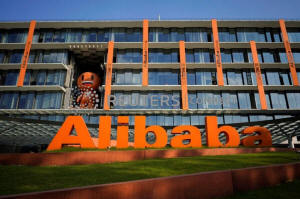Alibaba revenue grows at weakest pace in 3 years as
slowing China bites
 Send a link to a friend
Send a link to a friend
 [January 30, 2019]
By Josh Horwitz [January 30, 2019]
By Josh Horwitz
SHANGHAI (Reuters) - E-commerce giant
Alibaba Group Holding Ltd's quarterly revenue grew at its weakest pace
since 2016, as the impact of a slowing Chinese economy and a crippling
Sino-U.S. trade war kept buyers away during its top-sale season.
The result is likely to add to investor worries as it highlights the
mounting pressures facing the e-commerce behemoth, whose sales are often
seen as a yardstick of consumer spending in the world's second-largest
economy.
Alibaba, the second most valuable public company in Asia after Tencent,
posted on Thursday third-quarter revenue of 117.28 billion yuan ($17.47
billion), compared with 83 billion yuan a year earlier.
That compares with an estimate for revenue of 118.9 billion yuan from 31
analysts polled by Refinitiv.

Net income rose 33 percent to 30.96 billion yuan, however, beating
estimates and sending Alibaba's stock up by two percent in pre-market
trade. Alibaba typically posts its highest revenue in the December
quarter due to its mega "Singles' Day" in November - the world's biggest
online sales event that outstrips the sales of U.S. shopping holidays
Black Friday and Cyber Monday combined. In 2018, even though Alibaba
netted a record $30 billion from the Singles' Day, annual growth dropped
to the weakest rate in the event's 10-year history as a slowing Chinese
economy and trade tensions chilled sentiment.
Anticipating headwinds from economic uncertainty, Alibaba had lowered
its revenue outlook for its financial year ending March even before the
top sales season.
However, last week, Alibaba's executive vice-chairman, Joe Tsai, noted
that sales had ticked up in December, although demand for big-ticket
items continued to slow.
Tsai also brushed aside concerns about the trade war, saying people were
overly worried about its impact on China's economy.
[to top of second column] |

The logo of Alibaba Group is seen at the company's headquarters in
Hangzhou, Zhejiang province, China July 20, 2018. REUTERS/Aly
Song/File Photo

Chinese consumers are still fundamentally very strong and consumption is going
to grow over the next 5-10 years, he added.
Alibaba's founder Jack Ma has previously described the China-U.S. trade spat as
the "most stupid thing in the world".
China's economic growth in 2018 slowed to its weakest in nearly three decades
amid faltering domestic demand and bruising U.S. tariffs. Growth is expected to
ease further this year.
On Tuesday, China's Ministry of Industry and Information Technology (MIIT) said
revenue growth rates for domestic technology companies did not rise in 2018, and
that consumer spending had slowed amid increased economic pressures.
Businesses worldwide are bearing the brunt of slowing growth in China growth,
which has generated a third of global growth in recent years. Apple this weak
said its iPhone sales slipped in the holiday shopping quarter for the first time
due to weak demand in the Asian country.
Given signs of saturation in China's urban market, Alibaba has been trying to
grow outside of its core e-commerce business to win new customers.
The company continued to invest heavily in cloud computing, artificial
intelligence and online entertainment in the December quarter. Revenue from its
cloud business rose 84 percent to 6.6 billion yuan, while sales from its digital
entertainment and media business rose 20 percent to 6.5 billion yuan.
($1 = 6.7157 Chinese yuan renminbi)
(Reporting Josh Horwitz in SHANGHAI, Cate Cadell in BEIJING and Kanishka Singh
in Bengaluru; Editing by Sriraj Kalluvila and Mark Potter)
[© 2019 Thomson Reuters. All rights
reserved.] Copyright 2019 Reuters. All rights reserved. This material may not be published,
broadcast, rewritten or redistributed.
Thompson Reuters is solely responsible for this content. |